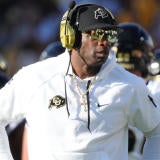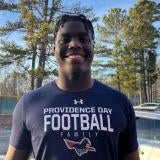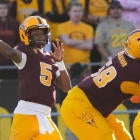
The University of Massachusetts is leaving the Mid-American Conference after the 2015 football season, sources told CBSSports.com. The MAC made the decision official with a formal announcement Wednesday afternoon.
There are no immediate indications where the school intends to park its football program, which is 2-22 in its first two years in the Football Bowl Subdivision. The Sun Belt is looking for a 12th member in football but there have been no indications that UMass would be a good fit.
UMass joined the MAC in April 2011 in football only, giving the conference 14 football-playing schools. Since then, Temple has left for the American Athletic Conference. The UMass departure leaves the MAC with 12 members in football.
When Temple left in March 2012, the conference had the ability to convert UMass' membership agreement to a term (number of years) agreement. That clause was exercised in February and provided for a minimum of two years of membership. The school was basically given roughly a month to decide whether it wanted to be a full member. The Minutemen will play football in the 2014 and 2015 seasons in the MAC.
All of UMass' other major sports compete in the Atlantic-10. The MAC will continue with 12 members in football and has no plans to expand in the near future, according to commissioner Jon Steinbrecher.
"That's where we're at," Steinbrecher said.
As part of the original MAC agreement, UMass agreed to play four games by its men's and women's basketball teams against MAC competition. Any games that are scheduled will be played but no new series will be started, Steinbrecher said. UMass won the Division I-AA (now Football Championship Subdivision) title in 1998. The school's last day as a MAC member will be the last day of football competition in 2015 (or 2016) whether that is the regular season, or a bowl game.
"This is clearly not something we relished when we brought them," Steinbrecher added, "[But] the potential for this to occur was anticipated."





















